Cheap Vs. Expensive – Which will win?
Today, there are many water filters available yet two popular filtration systems consistently stand out. Comparing ZeroWater vs Berkey water filtration systems, understanding the differences can help you make an informed decision tailored to specific needs. Both renowned brands offer unique features, filtration technologies, and considerations that play a role in ensuring clean and safe drinking water for your household. In this comprehensive comparison, we’ll explore various aspects—from filtration technology and design to cost-effectiveness and environmental impact—to guide you toward selecting the ideal water filtration solution. Whether you prioritize affordability, comprehensive filtration, or sustainability, this guide will clarify which system aligns best with your preferences and requirements.
Table of Contents
Filtration Technology
ZeroWater Filtration Technology
ZeroWater filtration uses a 5-stage system to remove virtually all dissolved solids from your water. Here’s a breakdown of each stage:
- Coarse Filter Screen: Removes suspended solids like dust and rust.
- Foam Distributor: Evenly distributes water across the filter to improve efficiency.
- Multi-layer Activated Carbon and Oxidation Reduction Alloy: Reduces chlorine, heavy metals, and other contaminants.
- Ion Exchange Resin: Removes dissolved salts and inorganic compounds.
- Ultra-fine Screen and Non-woven Membrane Layer: Provide the final filtration, ensuring no particles are left behind.

Key Features of ZeroWater:
- Removes 99.6% of total dissolved solids (TDS), including lead, chromium, and mercury.
- NSF certified for lead reduction.
- Produces water that measures 0 TDS on a digital meter.
Berkey Filtration Technology
Berkey uses a gravity-fed filtration system with proprietary “Black Berkey” filters. This system includes several stages:
- Micro-Porous Filtration: Removes sediment and larger particles.
- Adsorption: Reduces heavy metals, pesticides, and VOCs through a filtering process that binds these contaminants to the filter medium.
- Ion Exchange: Targets specific heavy metals like lead and mercury, replacing them with harmless ions.
- Granular Activated Carbon: Reduces chlorine, and organic chemicals, and improves taste and odor.
Key Features of Berkey: Removes over 200 contaminants, including bacteria and viruses. Capable of filtering out heavy metals, pesticides, and pharmaceuticals. This does not remove beneficial minerals from the water and is NSF (National Sanitation Foundation) and EPA-compliant (National Sanitation Foundation), though not officially certified.
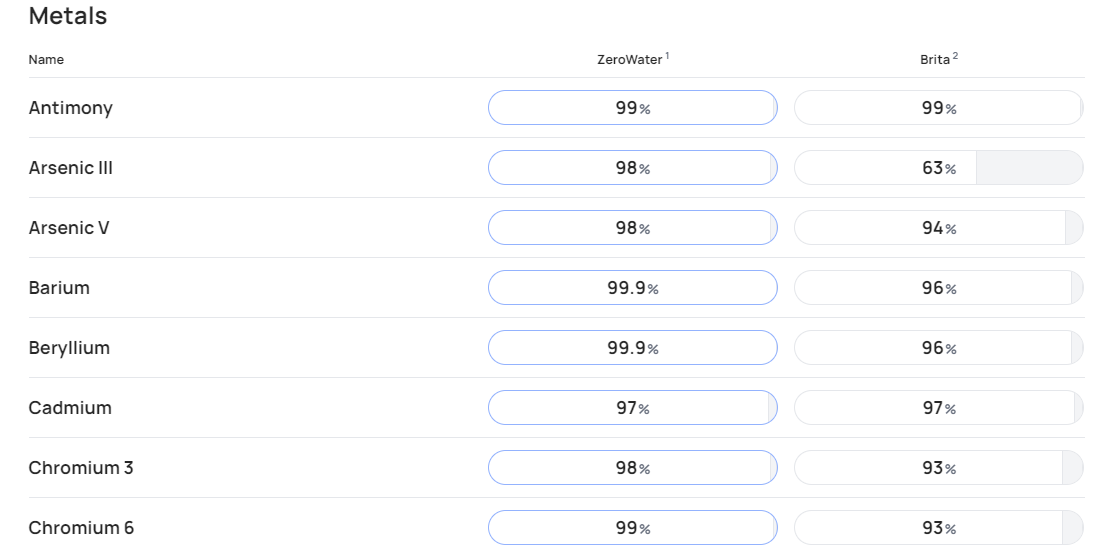
Design and Build Quality
When evaluating water filtration systems, the design and build quality are essential in durability, ease of use, and aesthetic appeal. ZeroWater vs Berkey, each brand offers distinct design features and construction materials that cater to different user preferences and needs.
ZeroWater Design and Build Quality
ZeroWater systems are designed with modern aesthetics and user convenience in mind. The main features include:
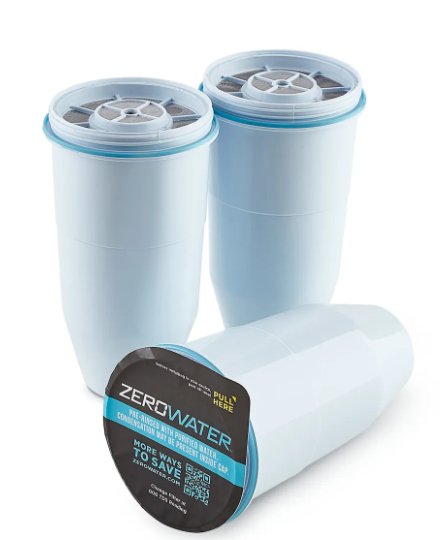
- Plastic Construction: ZeroWater pitchers and dispensers are primarily made from BPA-free plastic, which makes them lightweight and easy to handle.
- Compact and Space-Saving: ZeroWater offers a variety of models, from 6-cup pitchers to larger 40-cup dispensers, suitable for different household sizes and storage spaces.
- Clear Pitcher Design: The transparent design allows users to see the water level, adding a visual appeal and functionality.
- Digital TDS Meter: Most ZeroWater products come with a built-in (or included) digital Total Dissolved Solids (TDS) meter, making it easy to monitor water quality.
- Easy-to-Replace Filters: The filters are designed for quick and easy replacement, ensuring minimal hassle.
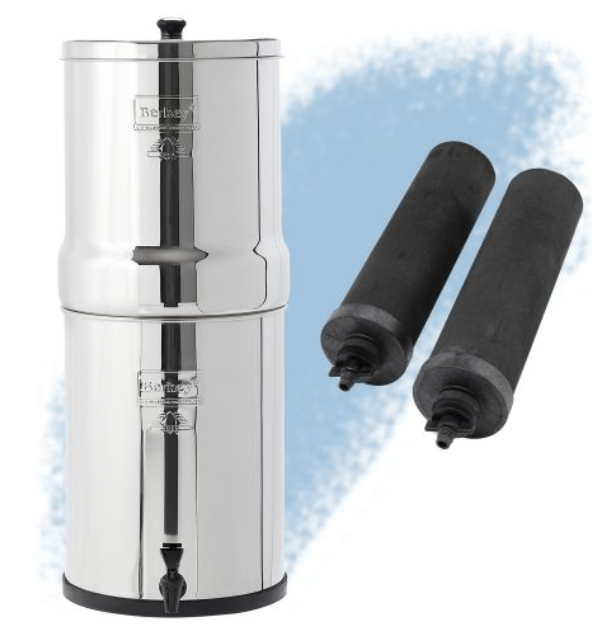
Berkey Design and Build Quality
Berkey systems are known for their robust and durable design, suitable for indoor and outdoor use. Key features include:
- Stainless Steel Construction: Berkey filters are housed in high-grade stainless steel containers, which are durable, corrosion-resistant, and easy to clean.
- Gravity-Fed System: Berkey uses a gravity-fed filtration process, which does not require electricity or plumbing, making it versatile and reliable in various settings.
- Various Sizes: Berkey offers several sizes, from the compact Travel Berkey (1.5 gallons) to the large Crown Berkey (6 gallons), accommodating different needs and usage scenarios.
- Modular Design: The design allows easy assembly and disassembly, facilitating portability and maintenance.
- Lid and Spigot: The systems are installed with a tight-fitting lid to prevent contamination and a convenient spigot for easy water dispensing.
In the ZeroWater vs Berkey comparison, ZeroWater stands out for its modern, lightweight design and ease of use, making it a great choice for those who prioritize convenience and compactness. Berkey; with its durable stainless steel construction and versatile gravity-fed system, is ideal for users looking for a robust and long-lasting solution suitable for various environments.
Filter Lifespan and Replacement Costs
Understanding the lifespan of filters, and the associated replacement costs is crucial when comparing water filtration systems. In the debate of ZeroWater vs Berkey, these factors will significantly influence the overall cost-effectiveness and maintenance requirements.
ZeroWater Filter Lifespan and Replacement Costs
ZeroWater filters are designed to provide thorough filtration but have a relatively shorter lifespan than Berkey’s filters. Here are the key points:
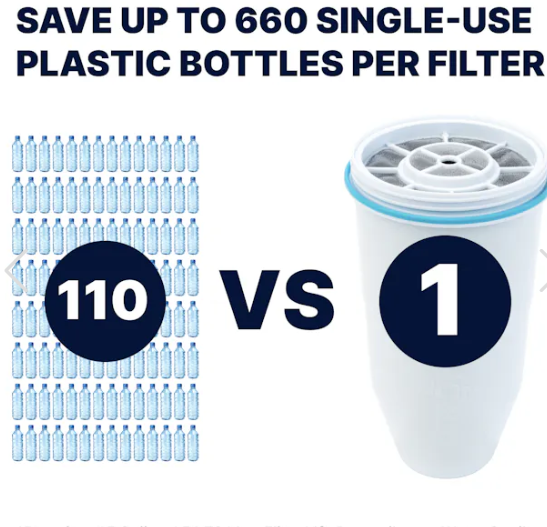
- Filter Lifespan: ZeroWater filters last about 2 to 4 months, depending on the water quality and usage. The lifespan is measured in gallons, with each filter capable of filtering about 20 to 40 gallons of water before needing replacement.
- Replacement Indicator: The digital Total Dissolved Solids (TDS) meter helps users determine when to replace the filter. When the TDS meter reads 006 or higher, it’s time for a new filter.
- Replacement Costs: ZeroWater filters are relatively affordable, with individual filters costing around $15 to $20. However, frequent replacements can add up, especially in areas with high TDS levels.
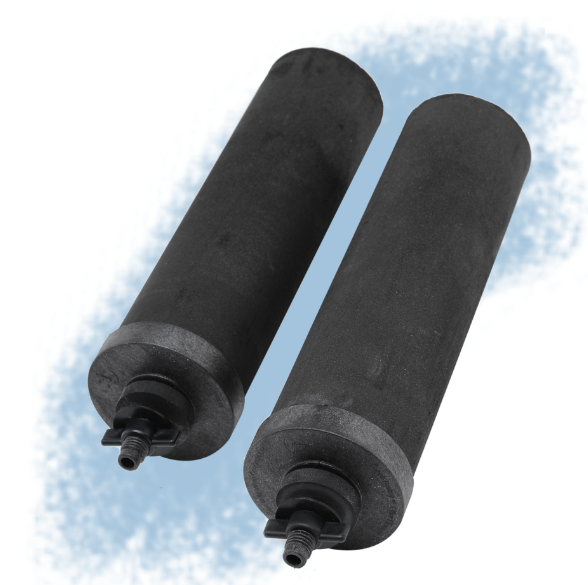
Berkey Filter Lifespan and Replacement Costs
Berkey filters, known for their longevity and high capacity, offer a more extended filter lifespan and lower long-term costs. Here’s a detailed look:
- Filter Lifespan: Berkey’s Black Berkey filters have an impressive lifespan, capable of filtering up to 3,000 gallons of water per filter element. With a typical system using two filters, this translates to around 6,000 gallons before needing replacement. This can last several years for an average household.
- Low Maintenance: Berkey filters can be cleaned and reused multiple times, extending their effective lifespan. Regular maintenance involves scrubbing the filter elements to remove sediment buildup.
- Replacement Costs: While the initial cost of Berkey filters is higher, around $120 for a pair of Black Berkey elements, their long lifespan means lower annual replacement costs. Over time, Berkey filters prove to be more cost-effective.
In the comparison of ZeroWater vs Berkey, Berkey stands out for its long filter lifespan and lower long-term replacement costs, making it an excellent choice for those seeking a low-maintenance, cost-effective solution. ZeroWater, while having a shorter filter lifespan and more frequent replacement needs, offers a convenient and easy-to-monitor system, suitable for users who prefer a straightforward approach to water filtration.
Capacity and Size Options
When choosing a water filtration system, the capacity and size options available can significantly impact usability and convenience. In the comparison of ZeroWater vs Berkey, each brand offers a range of models to cater to different household sizes and needs.
ZeroWater Capacity and Size Options
ZeroWater provides a variety of models, ensuring there’s a suitable option for every household. Here are the main options:
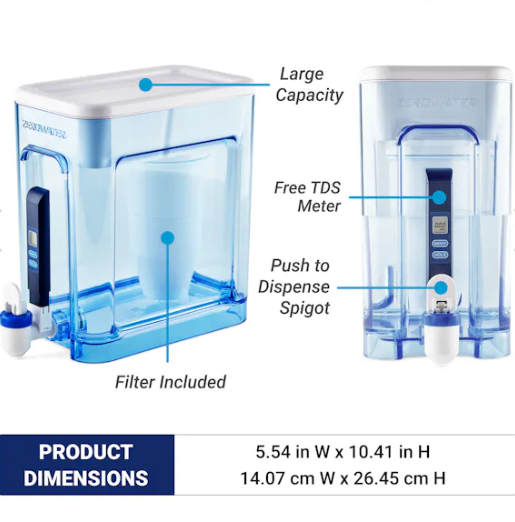
- 10-Cup Pitcher: A popular choice for small to medium-sized households.
- 12-Cup Ready-Pour Pitcher: Features a larger capacity and a convenient Ready-Pour spout that allows you to pour water without removing the lid.
- 20-Cup Dispenser: Designed for medium to large households, this dispenser can hold a significant amount and fits easily on countertops or refrigerator shelves.
- 40-Cup Ready-Pour Dispenser: perfect for large families or offices. It provides a high capacity while still maintaining a relatively compact footprint.
- 52-Ready Dispenser: The largest option for any large household!
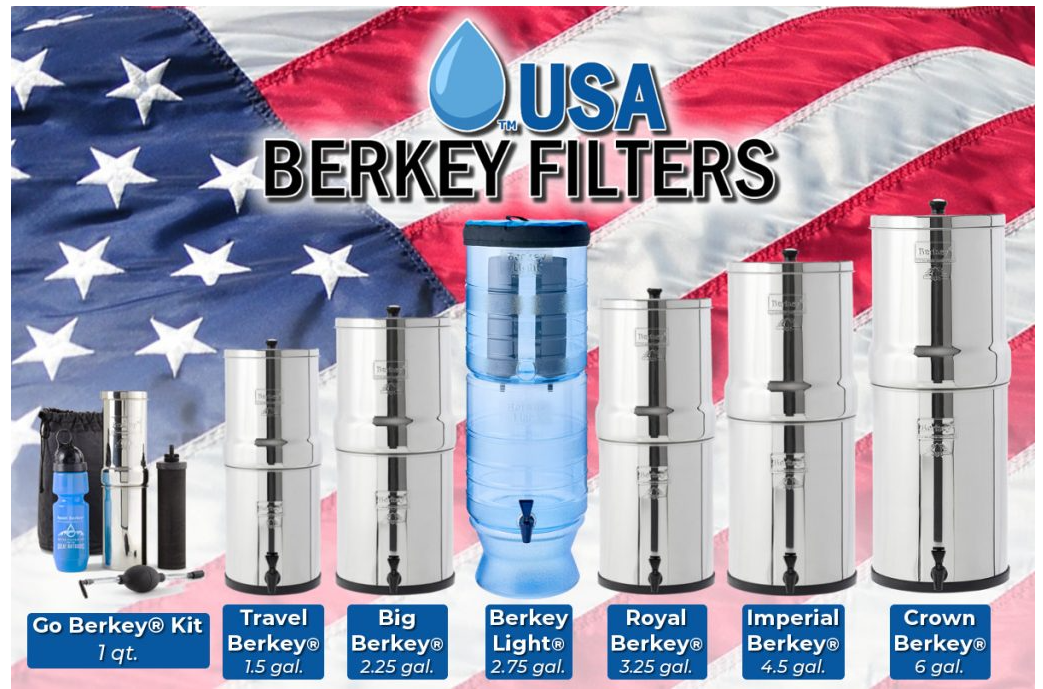
Berkey Capacity and Size Options
Berkey offers several models, each designed to cater to different usage scenarios, from personal use to large groups:
- Travel Berkey (1.5 Gallons): The smallest model, ideal for individuals or couples. Its compact size makes it perfect for travel or small kitchens.
- Big Berkey (2.25 Gallons): A versatile and popular choice for small to medium-sized families. It offers a good balance of capacity and portability.
- Royal Berkey (3.25 Gallons): Suitable for larger families, providing ample capacity without being too bulky.
- Imperial Berkey (4.5 Gallons): Designed for larger groups or extended families, offering a high capacity while maintaining counter space.
- Crown Berkey (6 Gallons): The largest model, perfect for large families, groups, or emergency preparedness. It provides the highest capacity and is suitable for places with higher water consumption needs.
In the ZeroWater vs Berkey comparison, ZeroWater excels in a range of compact, user-friendly models suitable for different household sizes, making it a great choice for those with limited space. Berkey; with its larger capacity options and versatile designs, is ideal for families, groups, and users who need a higher water output.
Price and Value for Money
Evaluating the price and value for money is crucial in choosing between water filtration systems. In the ZeroWater vs Berkey comparison, both systems offer distinct benefits that can influence their overall value based on your needs and budget.
ZeroWater Price:
ZeroWater systems are generally more affordable upfront but may incur higher long-term costs due to more frequent filter replacements. Here’s a detailed look:
- Initial Purchase Cost: ZeroWater pitchers and dispensers range from $20 to $50, depending on the model and capacity. This makes them accessible to a wide range of budgets.
- Filter Replacement Costs: ZeroWater filters typically cost between $15 and $20 each. Given their average lifespan of 20 to 40 gallons, users may need to replace them every 2 to 4 months, depending on usage and water quality.
- Long-term Costs: Over a year the cost of filter replacements can add up, especially in areas with high total dissolved solids (TDS). However, the included TDS meter helps users maximize filter life by indicating the exact time for replacement.
- Overall Value: ZeroWater offers good value for those who need a budget-friendly, easy-to-use system with excellent contaminant removal capabilities. The frequent need for filter replacement can be a drawback but is balanced by the system’s affordability and effectiveness.
Berkey Price:
Berkey systems have a higher initial cost but offer significant long-term savings due to the longevity of their filters. Here’s a detailed look:
- Initial Purchase Cost: Berkey systems range from $250 to $360 depending on the size and model. This higher upfront investment reflects the premium build quality and filtration capacity.
- Filter Replacement Costs: A pair of Black Berkey filter elements costs around $120. Each pair can filter up to 6,000 gallons of water, translating to several years of use for an average household.
- Long-term Costs: Despite the higher initial investment, the infrequent need for filter replacements makes Berkey systems cost-effective in the long run. The ability to clean and reuse filters further extends their lifespan and value.
- Overall Value: Berkey offers exceptional value for those who require a robust, durable system with minimal maintenance. The higher upfront cost is offset by the long-term savings on filter replacements and the system’s ability to handle a wide range of contaminants.
In the ZeroWater vs Berkey comparison, ZeroWater is the more affordable choice, making it accessible for those on a tight budget or those who prefer a lower upfront investment. Berkey, while more expensive upfront, offers greater long-term value due to the durability and longevity of its filters. Ultimately, the choice depends on prioritizing initial affordability or long-term cost-effectiveness and minimal maintenance.
Environmental Impact
When comparing water filtration systems, considering their environmental impact is essential. In the ZeroWater vs Berkey debate, both brands aim to offer eco-friendly solutions, but their approaches and overall environmental footprints differ.
ZeroWater Environmental Impact
ZeroWater is designed with some eco-friendly features, but there are areas where environmental impact can be a concern:
- Plastic Components: ZeroWater pitchers and dispensers are made from BPA-free plastic which is recyclable. However, the reliance on plastic can contribute to environmental waste if not properly recycled.
- Frequent Filter Replacements: ZeroWater filters must be replaced every 2 to 4 months, leading to more waste over time. While the filters are partially recyclable, the frequent need for replacements can increase environmental impact.
- Recycling Program: ZeroWater offers a filter recycling program. Users can recycle used filters back to ZeroWater to reduce waste and promote eco-friendly practices. Participation in this program can significantly mitigate the environmental impact of frequent filter replacements.

Berkey Environmental Impact
Berkey systems are designed with durability and sustainability in mind, resulting in a lower environmental footprint:
- Stainless Steel Construction: Berkey filters are housed in high-grade stainless steel containers, which are durable and long-lasting. Stainless steel is highly recyclable, reducing the environmental impact over its lifespan.
- Long-Lasting Filters: Berkey’s Black Berkey filters have an extensive lifespan, filtering up to 6,000 gallons of water before needing replacement. This longevity means fewer filters are disposed of over time, reducing waste.
- Minimal Plastic Use: Berkey systems use minimal plastic, focusing on durable, reusable materials. This approach contributes to a lower environmental impact for systems that rely heavily on plastic components.
- Eco-Friendly Practices: Berkey promotes eco-friendly practices through the long lifespan of their products and the minimal need for replacements. This sustainability focus aligns with the growing consumer demand for environmentally responsible products.

In the ZeroWater vs Berkey comparison, Berkey stands out for its environmentally friendly design, using durable materials and long-lasting filters to minimize waste. ZeroWater, while convenient and effective, can have a higher environmental impact due to its plastic components and frequent filter replacements. However, initiatives like ZeroWater’s recycling programs are demonstrated to reduce this impact.
For environmentally conscious consumers, Berkey offers a more sustainable choice, while ZeroWater provides options to mitigate its environmental footprint through recycling efforts.
Pros and Cons Summary
When deciding between ZeroWater and Berkey water filtration systems, weighing the pros and cons of each can help you make an informed choice based on your specific priorities.
ZeroWater Pros:
- Effective Filtration: ZeroWater uses a 5-stage filtration system to remove contaminants, achieving a 99.6% reduction of total dissolved solids (TDS), including lead and other heavy metals.
- Affordable: Initial purchase costs for ZeroWater pitchers and dispensers are relatively low, making them easily accessible.
- Convenient: The digital TDS meter helps users monitor water quality and determine when to replace filters, ensuring effective filtration.
- Compact and Lightweight: ZeroWater pitchers and dispensers are designed to be space-saving, easy to handle, and suitable for smaller households or limited kitchen space.
Cons:
- Frequent Filter Replacements: Filters need replacement every 2 to 4 months, depending on usage, which can increase long-term costs and environmental impact.
- Plastic Construction: While BPA-free, the reliance on plastic components may be a concern for those seeking more eco-friendly options.
- Taste Dependency: Some users may find that the 0 TDS water produced by ZeroWater has a different taste to mineral-rich water.
Berkey Pros:
- High-Quality Filtration: Berkey systems, using Black Berkey filters, remove a wide range of contaminants including bacteria, viruses, heavy metals, and chemicals.
- Long Filter Lifespan: Filters can purify up to 6,000 gallons of water before needing replacement, significantly reducing maintenance and replacement costs.
- Durable and Sustainable: Made from stainless steel, Berkey systems are durable, long-lasting, and recyclable, minimizing environmental impact.
- Versatile Sizes: Berkey offers various sizes from personal use to large family sizes, accommodating different household needs.
Cons:
- Higher Initial Cost: The upfront cost of Berkey Systems is higher compared to ZeroWater, which may be a consideration for budget-conscious buyers.
- Requires Space: Due to their larger size and gravity-fed design Berkey systems require more counter or storage space.
- No NSF Certification: While compliant with NSF/ANSI standards, Berkey filters are not NSF-certified, which may be a concern, for some users seeking certified filtration performance.
Conclusion and Final Thoughts.
Choosing between ZeroWater and Berkey water filtration systems depends on your needs, priorities, and personal budget.
Consider ZeroWater if:
- Budget is a primary concern: ZeroWater provides affordable options for effective water filtration, making it accessible to a wide range of budgets.
- You prefer compact and lightweight designs: ZeroWater pitchers and dispensers are designed to be space-saving and easy to handle, ideal for smaller households or limited kitchen space.
- You prioritize convenience: The included digital TDS meter helps monitor water quality and determines when to replace filters, ensuring consistent filtration performance.
Consider Berkey if:
- Long-term cost-effectiveness is important: Berkey systems offer substantial savings over time with durable construction and long-lasting filters, despite a higher initial investment.
- You prioritize comprehensive filtration: Berkey’s Black Berkey filters are capable of a wide range of contaminants, making them suitable for those who want thorough purification.
- You prefer sustainable and durable materials: Made from stainless steel, Berkey systems are built to last and are environmentally friendly, appealing to those seeking sustainability.
In the ZeroWater vs Berkey comparison, ZeroWater is favored for its affordability, effectiveness in reducing TDS, and user-friendly design. However, frequent filter replacements and plastic construction are notable considerations. Berkey excels in long-term cost-effectiveness, durability, and comprehensive filtration capabilities but comes with a higher initial investment and more counter space. Choosing between the two ultimately depends on balancing these factors according to your preferences for cost, filtration performance, and environmental impact.
For more information concerning health: Click Here!




